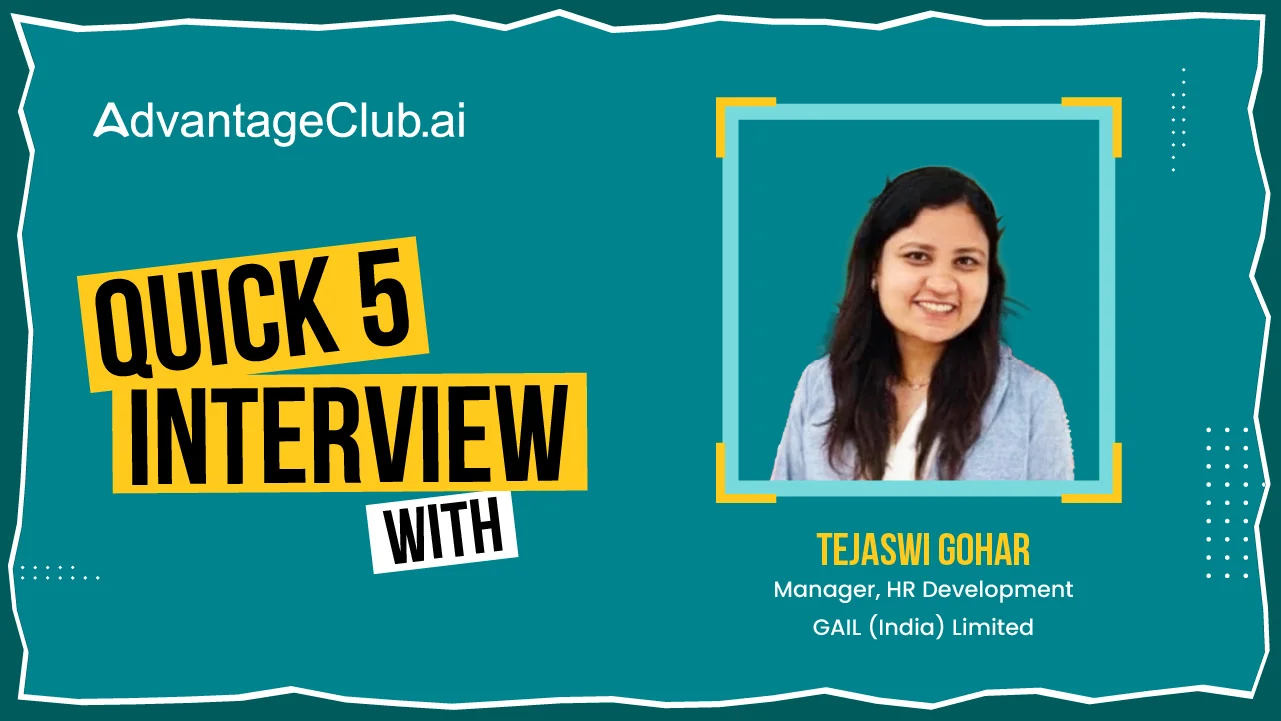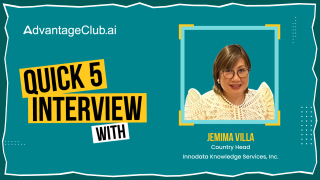Quick 5 Interview with GAIL (India) Limited’s Tejaswi Gohar

Team AdvantageClub.ai
October 24, 2025

In today’s ever-evolving HR landscape, where agility, empathy, and foresight define success, HR professionals like Tejaswi Gohar stand out for their grounded yet forward-thinking approach.
In this Quick 5 Interview series, she shares her reflections on her morning mantra that keeps her going, how she incorporates feedback in creating solutions that are empathetic and effective. Her candid insights reaffirm that while technology will continue to enhance HR practices, AI cannot replace the human element in employee engagement.
Here is the excerpt from the candid conversation with Tejaswi Gohar, Manager in the Human Resource Development Department at GAIL (India) Limited, where she drives key initiatives in employee engagement, talent management, analytics, and fosters a culture of continuous learning and growth. At GAIL, she has spent over six years designing and implementing people-centric initiatives and championing data-driven HR practices that enrich workplace experiences and strengthen organizational culture. She is also a winner of AdvantageClub.ai’s Most Admired Women Award 2025 in the Achiever category.
Read below:
Q1. What’s the one thing you do every morning to ensure you’re mentally prepared for the fast-paced world of work?
A1: Each morning, I begin my day with a deliberate pause, dedicating 10–15 minutes to align myself with both the day’s priorities and the larger strategic direction. I maintain a personal diary where I not only outline the tasks for the day in order of priority but also briefly reflect on what was accomplished the previous day. This daily discipline helps me stay intentional, focused, and aligned with a deeper sense of purpose in my work.
Q2. How do you integrate feedback from peers & seniors into your decisions, especially when it comes to enhancing workplace culture?
A2: I see feedback as a catalyst for growth and collaboration. I listen closely to the perspectives of peers and seniors, not just for what is said, but for the intent and insight behind it. I reflect on this input with openness and connect it to the broader context of team dynamics and organizational culture. This approach helps build a workplace environment where people feel heard, valued, and collectively invested in continuous improvement.
Q3. With the rise of AI and automation, how do you envision the future of employee engagement and recognition?
A3: AI will undoubtedly augment, but not replace, the human element in employee engagement. The future points toward hyper-personalization, where AI can offer real-time, data-driven insights into employee preferences, anticipate disengagement early, and enable recognition that aligns with individual motivations.
Yet, even in this data-driven landscape, the emotional core of engagement: empathy, connection, and purpose, will remain irreplaceable. The true differentiator will be how we blend intelligent technology with value-driven, human-centered leadership.
Q4. In your opinion, what’s the biggest misconception companies have about employee engagement, and how do you challenge that mindset?
A4: I believe that engagement cannot be driven solely through perks or isolated events/initiatives. In reality, true engagement is systemic; it’s shaped by leadership behaviour, meaningful work, fairness, and learning & growth opportunities.
I challenge this mindset by advocating data-backed, long-term strategies that align employee experience with business outcomes. Engagement is not an activity; it’s a culture we build intentionally.
Q5. Looking ahead, what are your aspirations in both your professional career and personal life?
A5: Professionally, I aspire to grow into a strategic HR leadership role where I can shape organizational design, elevate employee experience, and contribute meaningfully to future-of-work agendas. Personally, I am committed to continuous learning, reflective writing, and engaging with platforms that promote thoughtful exchange of ideas. I also hope to explore the world more actively, as every new perspective is essential for holistic growth and nuanced leadership.
Conclusion
Tejaswi’s perspective reminds us that employee engagement is about building environments where people feel seen, heard, and empowered. It’s voices like hers that anchor us in what truly matters: human connection, continuous learning, and purposeful leadership.
We have many more such interesting conversations lined up for you. Stay tuned!





